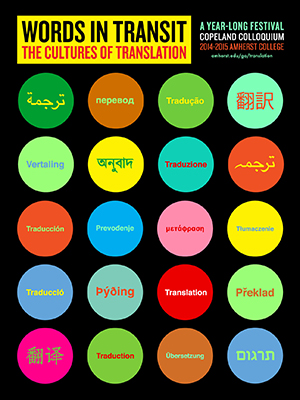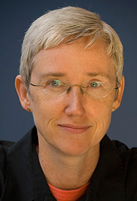The role that translation plays in the advancement of knowledge, culture and the liberal arts won't be lost on the campus community this academic year.
That’s because faculty organizers at Amherst College have selected translation as the theme for the college’s Copeland Colloquium, titled "Words in Transit: The Cultures of Translation."

The program, which has a different focus each year, brings visiting scholars and artists from around the world to Amherst’s campus to probe a topic of mutual interest, and to engage the members of the community through intellectual exchange, programs, and events. Past Colloquia have examined the place of art in a global society, the future of the humanities, and the science, politics, and ethics of environmentalism, among other topics.
During the 2014-2015 academic year, translation will be the focus of a year-long series of lectures, films, courses, theatrical performances and other events. The participants will make use of social media and other forms of technology to extend the conversation to a worldwide audience. Copeland events will be posted on a special website, in addition to being featured on the college’s online events calendar.
Highlights include:
- A film festival at Amherst Cinema, with Amherst professors and actors introducing films that include Lost in Translation, Grand Illusion, Pan’s Labyrinth and Russian Ark.
- An outdoor performance on Amherst’s main quad by Ashfield’s internationally known Double Edge Theater Company on Sept. 28. The event will transport the audience to the mythic and enthralling worlds of Don Quixote, Odysseus, and Shahrazad through poetry, flying, humor, live music, puppets and the visual arts.
- A conversation between Amherst professor Ilan Stavans and author and international investigative reporter Jon Lee Anderson.
- An immigration-themed oral history project, done in partnership with and to be broadcast on New England Public Radio. Amherst College students will interview dozens of immigrants to the Pioneer Valley who come from regions of the world where languages other than English are spoken. They will reflect about their odyssey of assimilation from the perspective of language.
- Collaboration with the Theater and the English as a Second Language Departments at Amherst Regional High in which Amherst College students will help create plays based on the experience of high-school students learning English as a second language.
- A special issue of the Common, an award-winning literary magazine based at Amherst College, devoted to Middle Eastern literature and a series of panels in which writers and translators from the region will talk to the Amherst College community.
- Four Town Hall multi-media conversations, hosted at Amherst and featuring major international figures, that will be linked to sites all over the globe, including Buenos Aires, New Delhi, Moscow and Kingston.
- A digital book based upon the year’s conversations to be published by a major trade press.
 Stavans, Amherst’s Lewis-Sebring Professor in Latino and Latino American Cultures, said the impetus for this year’s Copeland theme came about during a conversation with Catherine Ciepiela ’83, herself a prominent translator of Russian poetry and literature.
Stavans, Amherst’s Lewis-Sebring Professor in Latino and Latino American Cultures, said the impetus for this year’s Copeland theme came about during a conversation with Catherine Ciepiela ’83, herself a prominent translator of Russian poetry and literature.
Ciepiela, the Howard M. and Martha P. Mitchell Professor of Russian, is also a member of this year’s Copeland Colloquium Core Organizing Committee, along with Stavans and Anston Bosman, Associate Professor of English, and John Drabinski, Professor of Black Studies.

Stavans is a noted translator himself (including, in 2002, the first chapter of Cervantes’ Don Quixote into Spanglish, a hybrid language about which Stavans has written extensively). He’s also the founder and publisher of Restless Books, a digital imprint devoted to publishing translations of literature from around the globe into English.
The two agreed that the timing to explore translation at Amherst is perfect because it comes during a period when the college is engaged in strategic planning that includes developing ways to internationalize Amherst’s liberal arts educational experience. Also, translation is core to the mission of a liberal arts college.
"Translation goes to the heart of what we do in the liberal arts, which is to practice interpretation,” Ciepiela said. “Translation is writing as interpretation. And in requiring you to give exquisite attention to another person's language and responsively reshape it, translation is a profound form of human engagement."
The setting is appropriate as well, because translation has figured prominently in the scholarly lives of several distinguished Amherst faculty over the years.
A sampling of examples, in addition to Stavans and Ciepiela: Poet Richard Wilbur’s translations of French verse; Henry Steele Commager Professor and Professor of Russian Stanley Rabinowitz’s translations of Russian texts on dance and ballet; French professor Laure Katsaros’ translations of American poetry into French; Professor of Law, Jurisprudence and Social Thought Adam Sitze’s translations of Italian critical theory; and Spanish Professor James Maraniss’s translations of Cuban writer Antonio Benítez-Rojo.
“Translation as a theme can serve as a portal, opportunity and excuse to address the comings and goings between the local and the international, and between the individual and society in a way that can be interdisciplinary and cutting edge,” Stavans said. “I hope this series of events will show us that translation is not a narrow field, but a very broad one through which you can achieve multiple things.”
###